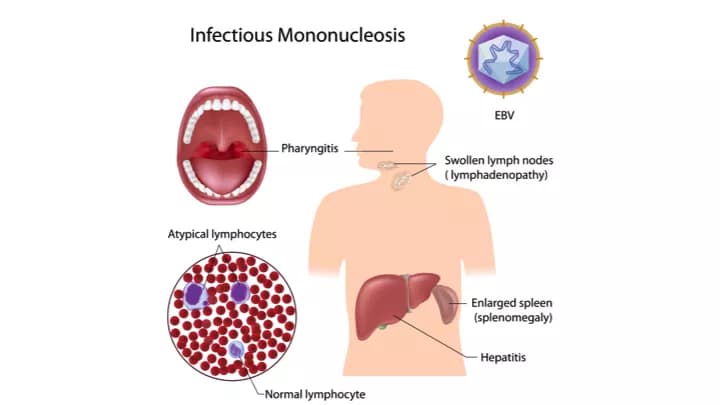What are the other Names for this Condition? (Also known as/Synonyms)
- Glandular Fever
- Kissing Disease
- Mono
What is Infectious Mononucleosis? (Definition/Background Information)
- Infectious Mononucleosis, also known as Mono, is an infection caused by the Epstein-Barr virus (EBV). The disease is contagious and can spread through contaminated saliva and other bodily fluids
- The most common signs and symptoms of Infectious Mononucleosis include fever, fatigue, and a sore throat. Following exposure to the virus, the symptoms may start to appear after about four to six weeks
- Infectious Mononucleosis is usually self-limiting and subsides on its own; having plenty of rest and fluids can help mitigate the symptoms. The prognosis is generally excellent in most cases
Who gets Infectious Mononucleosis? (Age and Sex Distribution)
- Although people of all ages can be infected by the virus, Infectious Mononucleosis is more common among teenagers and young adults
- Both males and females are affected, and no gender preference is noted
- Worldwide, individuals of all racial and ethnic groups can be affected
What are the Risk Factors for Infectious Mononucleosis? (Predisposing Factors)
The risk factors for Infectious Mononucleosis include:
- Sharing drinks, food utensils, and any other objects containing infected saliva
- Sexual contact with someone who has Infectious Mononucleosis
- Contaminated blood transfusions
- In rare cases, organ transplantations may be a source of Infectious Mononucleosis spread
It is important to note that having a risk factor does not mean that one will get the condition. A risk factor increases one’s chances of getting a condition compared to an individual without the risk factors. Some risk factors are more important than others.
Also, not having a risk factor does not mean that an individual will not get the condition. It is always important to discuss the effect of risk factors with your healthcare provider.
What are the Causes of Infectious Mononucleosis? (Etiology)
- Infectious Mononucleosis is caused by Epstein-Barr virus (EBV), which is part of the herpes virus family. Once the virus has been transmitted, it can stay dormant in the body and become active at a later time
- The infection is commonly transmitted by coming into contact with the saliva or bodily fluids of infected individuals
What are the Signs and Symptoms of Infectious Mononucleosis?
The signs and symptoms of Infectious Mononucleosis may include:
- Fatigue
- Sore throat
- Fever
- Headaches and body aches
- Swollen lymph nodes (primarily in the neck and armpits)
- Skin rash
How is Infectious Mononucleosis Diagnosed?
Infectious Mononucleosis can be diagnosed on the basis of the following information:
- A complete physical examination and evaluation of medical history
- Assessment of the presenting signs and symptoms
- Blood tests to check for blood cell count, antibodies to EBV, antigen testing, and peripheral smear exams
- In rare cases, viral cultures may be performed
Many clinical conditions may have similar signs and symptoms. Your healthcare provider may perform additional tests to rule out other clinical conditions to arrive at a definitive diagnosis.
What are the possible Complications of Infectious Mononucleosis?
Infectious Mononucleosis usually resolves without any long-term complications. However, less commonly, the complications noted may include:
- Enlarged spleen or liver (splenomegaly or hepatomegaly respectively)
- Liver conditions leading to jaundice (yellowing of the skin and whites of eyes) or hepatitis (liver inflammation)
- Anemia (decreased amount of red blood cells) causing pale skin, fatigue, and shortness of breath
- Low urine output due to dehydration
- Difficulty in breathing or swallowing due to swollen tonsils
- Myocarditis (heart inflammation)
How is Infectious Mononucleosis Treated?
Presently, there is no specific treatment available for Infectious Mononucleosis. Measures that can be taken to alleviate the signs and symptoms include:
- Drinking plenty of fluids with a healthy diet
- Getting lots of rest
- Using over-the-counter pain relief medications such as Tylenol and Ibuprofen
- Daily salt-water gargling to relieve sore throat
Although many symptoms of Infectious Mononucleosis may resemble that of a bacterial infection, antibiotics will not treat the infection due to its viral origin. However, antibiotics may be recommended by the healthcare provider to relieve potential secondary bacterial infections accompanying Infectious Mononucleosis, such as strep throat or tonsillitis.
How can Infectious Mononucleosis be Prevented?
Presently, there is no vaccine available for the Epstein-Barr virus that causes Infectious Mononucleosis. However, one can reduce the risk of contracting the infection through measures such as:
- Avoiding contact with individuals with Infectious Mononucleosis
- Avoidance of sharing food utensils, glassware, toothbrushes, and any other items that may cause saliva contamination from someone with the infection
- Avoidance of kissing and sexual contact with infected individuals
If there is a suspicion of Infectious Mononucleosis, it is better to check with the healthcare provider to confirm the diagnosis and receive proper treatment instructions to ease the symptoms throughout the course of the infection.
What is the Prognosis of Infectious Mononucleosis? (Outcomes/Resolutions)
- The prognosis of Infectious Mononucleosis is generally excellent since the disease usually subsides on its own with no long-term complications being noted
- The signs and symptoms of Infectious Mononucleosis can be minimized by drinking plenty of fluids, getting lots of rest, and taking pain-relief medications, as necessary
- In some individuals, the signs and symptoms may be prolonged for several months causing extreme fatigue
Additional and Relevant Useful Information for Infectious Mononucleosis:
The following link is a useful resource to learn more about diagnosing Infectious Mononucleosis:
https://www.dovemed.com/common-procedures/procedures-laboratory/mononucleosis-blood-test/
Related Articles
Test Your Knowledge
Asked by users
Related Centers
Related Specialties
Related Physicians
Related Procedures
Related Resources
Join DoveHubs
and connect with fellow professionals


0 Comments
Please log in to post a comment.